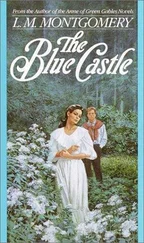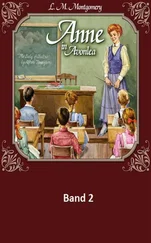"Your lovingest daughter, "Emily B. Starr.
"P. S. Dear Father, it is lovely to write to you. But O, I never get an answer back.
"E. B. S.”
CHAPTER 18. FATHER CASSIDY
Consternation reigned at New Moon. Everybody was desperately unhappy. Aunt Laura cried. Aunt Elizabeth was so cantankerous that there was no living with her. Cousin Jimmy went about as one distracted and Emily gave up worrying about Ilse's mother and Silas Lee's remorseful ghost after she went to bed, and worried over this new trouble. For it had all originated in her disregard of New Moon tradition in making calls on Lofty John, and Aunt Elizabeth did not mince matters in telling her so. If she, Emily Byrd Starr, had never gone to Lofty John's she would never have eaten the Big Sweet apple, and if she had never eaten the Big Sweet apple Lofty John would not have played a joke on her and if he had not played a joke on her Aunt Elizabeth would never have gone and said bitter, Murray-like things to him; and if Aunt Elizabeth had never said bitter Murray-like things to him Lofty John would not have become offended and revengeful; and if Lofty John had not become offended and revengeful he would never have taken it into his lofty head to cut down the beautiful grove to the north of New Moon.
For this was exactly where this house-that-jack-built progression had landed them all. Lofty John had announced publicly in the Blair Water blacksmith shop that he was going to cut down the bush as soon as harvest was over — every last tree and sapling was to be laid low. The news was promptly carried to New Moon and upset the inhabitants thereof as they had not been upset for years. In their eyes it was nothing short of a catastrophe.
Elizabeth and Laura could hardly bring themselves to believe it.
The thing was incredible. That big, thick, protecting bush of spruce and hardwood had ALWAYS been there; it belonged to New Moon MORALLY; even Lofty John Sullivan would not DARE to cut it down.
But Lofty John had an uncomfortable reputation for doing what he said he would do; that was a part of his loftiness; and if he did — if he did — "New Moon will be ruined," wailed poor Aunt Laura. "It will look DREADFUL — ALL its beauty will go — and we will be left open to the north wind and the sea storms — we have always been so warm and sheltered here. And Jimmy's garden will be ruined too.”
"This is what comes of bringing Emily here," said Aunt Elizabeth.
It was a cruel thing to say, even when all allowances were made — cruel and unjust, since her own sharp tongue and Murray sarcasm had had quite as much to do with it as Emily. But she said it and it pierced Emily to the heart with a pang that left a scar for years.
Poor Emily did not feel as if she needed any additional anguish.
She was already feeling so wretched that she could not eat or sleep. Elizabeth Murray, angry and unhappy as she was, slept soundly at nights; but beside her in the darkness, afraid to move or turn, lay a slender little creature whose tears, stealing silently down her cheeks, could not ease her breaking heart. For Emily thought her heart WAS breaking; she couldn't go on living and suffering like this. Nobody could.
Emily had lived long enough at New Moon for it to get pretty thoroughly into her blood. Perhaps it had even been born there.
At any rate, when she came to it she fitted into its atmosphere as a hand into a glove. She loved it as well as if she had lived there all her short life — loved every stick and stone and tree and blade of grass about it — every nail in the old, kitchen floor, every cushion of green moss on the dairy roof, every pink and white columbine that grew in the old orchard, every "tradition" of its history. To think of its beauty being in a large measure reft from it was agony to her. And to think of Cousin Jimmy's garden being ruined! Emily loved that garden almost as much as he did; why, it was the pride of Cousin Jimmy's life that he could grow there plants and shrubs that would winter nowhere else in P. E. Island; if the northern shelter were removed they would die. And to think of that beautiful bush itself being cut down — the To-day Road and the Yesterday Road and the To-morrow Road being swept out of existence — the stately Monarch of the Forest discrowned — the little playhouse where she and Ilse had such glorious hours destroyed — the whole lovely, ferny, intimate place torn out of her life at one fell swoop.
Oh, Lofty John had chosen and timed his vengeance well!
When would the blow fall? Every morning Emily listened miserably as she stood on the sandstone doorstep of the kitchen, for the sound of axe blows on the clear September air. Every evening when she returned from school she dreaded to see that the work of destruction had begun. She pined and fretted. There were times when it seemed to her she couldn't bear her life any longer. Every day Aunt Elizabeth said something imputing the whole blame to her and the child grew morbidly sensitive about it. Almost she wished Lofty John would begin and be done with it. If Emily had ever heard the classic story of Damocles she would have heartily sympathized with him. If she had had any hope that it would do any good she would have swallowed Murray pride and Starr pride and every other kind of pride and gone on her knees to Lofty John to entreat him to hold his revengeful hand. But she believed it would not. Lofty John had left no doubt in anybody's mind as to his bitter determination in the matter. There was much talk about it in Blair Water and some were very well pleased at this blow to New Moon pride and prestige, and some held that it was low and unclean behaviour on Lofty John's part, and all agreed that this was what they had prophesied all along as bound to happen some day when the old Murray-Sullivan feud of three generations should have come to its inevitable head. The only surprising thing was that Lofty John hadn't done it long ago. He had always hated Elizabeth Murray since their school-days, when her tongue had not spared him.
One day by the banks of Blair Water Emily sat down and wept. She had been sent to trim the dead blossoms off the rosebushes on Grandmother Murray's grave; having finished her task she had not the heart to go back to the house where Aunt Elizabeth was making everybody miserable because she was herself so unhappy. Perry had reported that Lofty John had stated the day before at the blacksmith's that he was going to begin cutting down the big bush on Monday morning.
"I CAN'T bear it," sobbed Emily to the rose-bushes.
A few late roses nodded at her; the Wind Woman combed and waved and stirred the long green grasses on the graves where proud Murrays, men and women, slept calmly, unstirred by old feuds and passions; the September sunlight shone beyond on old harvest fields mellowly bright and serene, and very softly against its green, shrub-hung bank, purred and lapped the blue Blair Water.
"I don't see why God doesn't STOP Lofty John," said Emily passionately. Surely the New Moon Murrays had a right to expect that much from Providence.
Teddy came whistling down the pasture, the notes of his tune blowing across the Blair Water like elfin drops of sound, vaulted the graveyard fence and perched his lean, graceful body irreverently on the "Here I stay" of Great-Grandrnother Murray's flat tombstone.
"What's the matter?" he said.
"Everything's the matter," said Emily, a little crossly. Teddy had no business to be looking so cheerful. She was used to more sympathy from Teddy and it aggravated her not to find it. "Don't you know Lofty John is going to begin cutting down the bush Monday?”
Teddy nodded.
"Yep. Ilse told me. But look here, Emily, I've thought of something. Lofty John wouldn't dare cut down that bush if the priest told him not to, would he?”
Читать дальше


